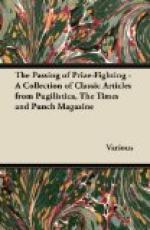This felicitous situation is interrupted by the spiteful Duchess; the lover escapes behind the window curtains to avoid scandal—is discovered, and his sovereign’s reputation is only saved by the declaration of Felicia, that the Captain is there on her account. Ollivarez asserts that they are married, to clench the fib—the Queen sees her folly—the Duchess is disgraced—all the characters stand in the well-defined semicircle which is the stage method of writing the word “finis”—Mrs. Yates speaks a very neat and pointed “tag”—and that’s all.
For this two-act Comidetta, dear Yates, we pronounce absolution and remission of thy sins, so wickedly committed in the washy melo-drama, and cackling vaudeville, thou hast recently affronted common-sense withal! Thine own acting as the courtier was natural, except when thou didst interpolate the dialogue with the baby—a crying sin, believe us. Else, thy bows were graceful; and thy shoulder-shrugs—are they not chronicled in the mind’s eye of thy most distant admirers? The little touches of humour that shone forth in the dialogue assigned to thee, were not exaggerated by the too-oft-indulged-in grimaces—in short, despite thy too monstrous chapeau-bras—which was big enough for a life-boat—thou lookedst like a Duke, a gentleman, and what in truth thou really art—an indefatigable intriguant. Thy favoured help-mate, too, gave a reality to the scene by her captivating union of queenly dignity and feminine tenderness. But most especially fortunate art thou in thy Felicia. Alas for our hunch and our hatchet nose! but O, alas! and alas! that we have a Judy! for never did we regret all three so deeply as while Miss Ellen Chaplin was on the stage. In our favourite scene with the Queen and her lover, how graceful and expressive were her dumb answers to what ought to have been Henrico’s eloquent declarations, spoken through the Queen. We charge thee, dear friend, to “call” her on Monday morning at eleven, and to rehearse unto her what we are going to say. Tell her that as she is young, a bright career is before her if she will not fall into the sin of copying some other favourite actress—say, for instance, Mrs. Yates—instead of our arch-mistress, Nature; say, moreover, that at the same time, she must be unwearying in acquiring art; lastly, inform her, that Punch has his eye upon her, and will scold her if she become a backslider and an imitator of other people’s faults.




